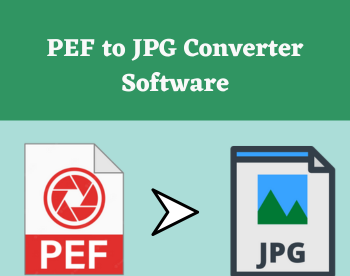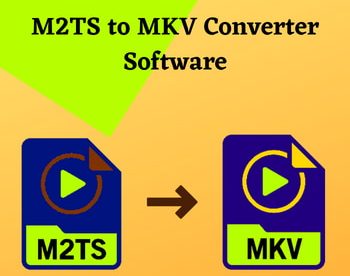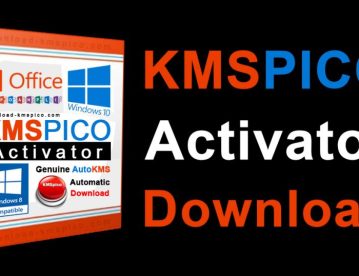5 Best Free Mars Simulator Software for Windows
Here is a list of best free Mars simulator software for Windows. These free software are used to visualize and analyze Mars planet for research purpose or for general interest to explore life on Mars. You can view and explore Mars and its moons called Phobos and Deimos in real time using these software. Also, some simulation parameters can be customized to carry on Mars simulation, such as speed, date, time, etc. You can easily go to a particular location on Mars using respective GPS coordinates in many of these software.
Most of these are solar system explorer software, so you easily visualize more planets and other objects of a solar system. These software provide various features to navigate through Mars or other planets of the solar system, such as Zoom in/out, Ride-along view, Free Fly, Move in/out, Fullscreen, etc. In one of these software, you can even create an AVI movie of Mars simulation. And, you can also save Mars view as an image. All in all, these are really good software for all those who want to visualize Mars and study its behavior.
My Favorite Free Mars Simulator for Windows:
Mars Simulation Project is one of my favorite Mars simulation software on this list. It is specially designed for the purpose of analyzing and visualizing Mars in different conditions. You can find a feature rich set of tools to explore Mars through it. Check out its full description to know more.
NASA’s Eyes is another good one as it provides a great experience of exploring Mars in 3D view.
You may also like some best free Solar Eclipse Simulators, Lunar Eclipse Simulators, and Star Tracker Software for Windows.
Mars Simulation Project
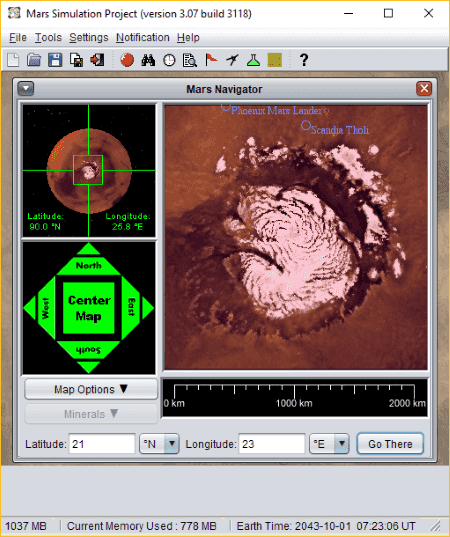
Mars Simulation Project is a free portable Mars simulator for Windows. It is a Java-based software, so you need to have Java installed on your system for it to work.
How to simulate Mars planet using this free portable software:
This software provides a few sample simulations with predefined configurations to use. Or, you can also create and start a new simulation with customized values of population, longitude, latitude, etc. After starting a simulation, click on its Tools > Mars Navigator to visualize Mars on the screen. You can now navigate through Mars using given control options.
Features:
- You can customize Map Options such as show minerals, show explored sites, day/night tracking, topographical mode, show landmarks, etc.
- It contains a Mission Tool which shows information and navigation points for mineral exploration and regolith prospecting.
- You can also find ongoing scientific studies with details including primary researchers.
- It also provides you Time Tool (displays current time in simulation), Ressuply Tool (displays info on arrived and resupply missions), Monitor Tool (displays info on people, vehicles, settlements, and missions in simulation), Search Tool, etc.
- It also displays notification messages.
Conclusion:
It is one of the most featured software for the Mars simulation. It contains all essential and even advanced tools to visualize and analyze Mars planet in real time. Additionally, as it is portable, you don’t have to install it on your system and you can just use it when required.
NASA’s Eyes
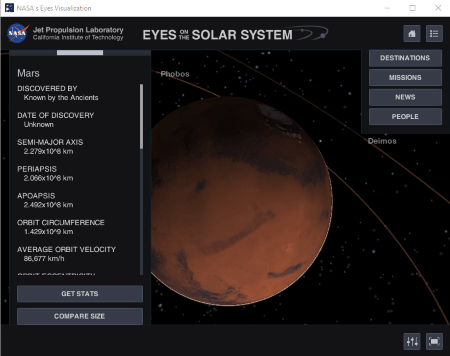
NASA’s Eyes is a featured Earth and solar system visualization software for Windows. As it lets you perform solar system simulation, you can also use it as a Mars simulator. Let’s see how.
How to simulate Mars using NASA’s Eyes:
- Launch it and open the “Eyes on the Solar System” simulation. You will now be able to view all planets revolving in an orbit.
- Now, click on Destinations button and choose Mars planet to view it individually.
It will now start real time Mars simulation with larger and smaller moons i.e., Phobos and Deimos. You can use your mouse to view Mars from different sides and angle. Besides that, it lets you view basic description, Mars statistics (orbit circumference, average orbit velocity, orbit eccentricity, mean radius, orbit inclination, etc.), and more.
Features:
- It provide a 3D view mode for Mars simulation.
- It contains an Advanced Mode for simulation of solar system or Mars, using which you can adjust some parameters for planet simulation like date, time, speed, etc.
- You get various visual controls for navigation including Ride-along view, Free Fly, Zoom-in view, Move in/out, Fullscreen, etc.
- It can also be used for Solar Eclipse Simulation.
Conclusion:
It is a great free 3D Mars simulation software which provides real time simulation and also displays essential information about Mars.
Celestia
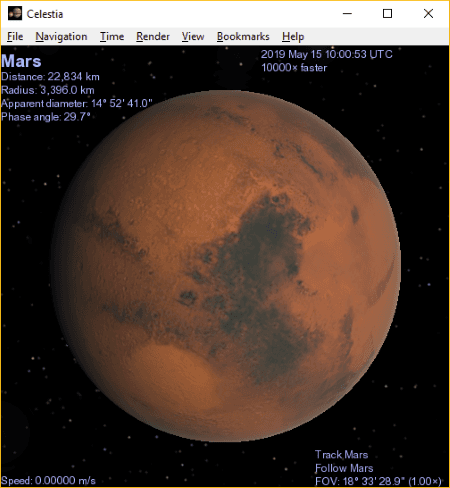
Celestia is a free space simulation software for Windows, Linux, and Mac OS X. It can also be used for solar system simulation including Mars simulation. It lets you simulate and visualize Mars planet individually. Let’s checkout how.
How to perform Mars simulation using Celestia:
- Open this software and go to its Navigation menu > Solar System Browser.
- Now, select the object which you want to go to. In this case, it is Mars; so, select it and click the Go To button.
As you do that, it will show real time Mars simulation on its interface. You can view many stats about the simulation on the screen including distance, radius, apparent diameter, phase angle, date and time, etc.
Features:
- It lets you go to the moons of Mars, Phobos and Deimos.
- You can increase or decrease the simulation speed by 10 times.
- It lets you customize view options, such as: show/ hide moons, comets, spacecraft, clouds, atmospheres, etc.
- You can customize a lot of render preferences like ambient light, texture resolution, auto magnitude, etc.
- It lets you capture a movie of Mars simulation which can be saved in AVI format. You can also capture the screenshots of the same.
- It can be used as a solar eclipse and lunar eclipse simulator.
Conclusion:
It is one of the best Mars simulators which offers more handy features including solar system browser and solar and lunar eclipse finder.
Solar System Imaging Simulator
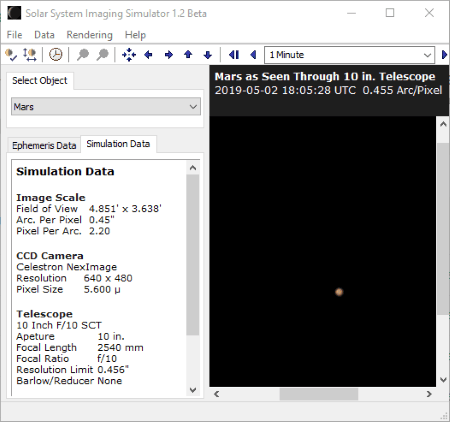
Solar System Imaging Simulator is the next free Mars simulator for Windows. As the name suggests, it is basically a software to visualize planets with astrophotography equipment. Using it, you can simulate solar system objects in 3D including Mars.
How to perform Mars simulation using Solar System Imaging Simulator:
After launching this software, choose Mars from Select Object section. You will now be able to visualize Mars with Ephemeris Data and Simulation Data. These data basically include information like time, appearance data, position, field of view, etc.
From Rendering > Image Scale option, you can set preferences like telescope/ camera image scale, field of view, etc. Plus, some more rendering options like enable/disable draw Uranian Ring System, draw labels, rendering quality, etc., can be set to customize simulation view.
More Features:
- It lets you edit telescope and camera properties in its inbuilt database.
- You can export Ephemeris Data to an HTML file.
- You can also save current image of Mars in JPG and BMP formats.
Conclusion:
Solar System Imaging Simulator is a nice and simple to use Mars simulator and an overall solar system simulator which you can use for free.
Mars Simulation
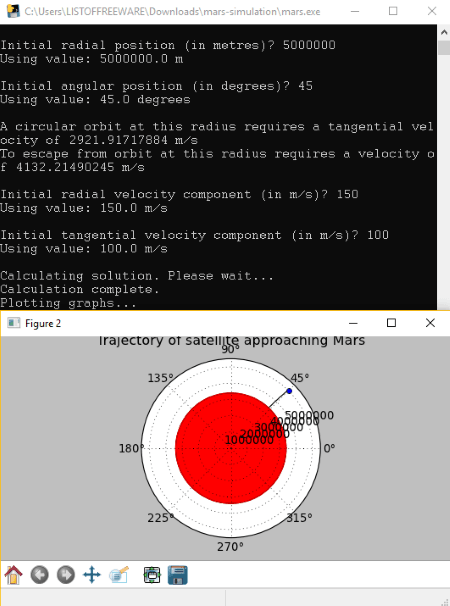
Mars Simulation is another portable Mars simulator software on this list. It is command based software which basically generates graphs showing the trajectory of satellite approaching Mars. You can enter the details of satellite and then it will create graphs.
How to use this mars simulation software:
- Launch its application file and then enter simulation parameters to generate graphs, such as coordinate system, simulation time, initial radial position, initial angular position, initial radial velocity component, initial tangential velocity component, etc.
- After entering simulation parameters, hit the Enter button and you will be able to view two graphs which include Trajectory of Satellite approaching Mars and Total Energy of Satellite vs Time.
You can save the graphs as images in various formats such as PNG, EPS, JPG, SVG, TIFF, etc.
Conclusion:
Mars Simulation is a decent software to analyze the trajectory of a satellite under the Mars gravitational force influence.
About Us
We are the team behind some of the most popular tech blogs, like: I LoveFree Software and Windows 8 Freeware.
More About UsArchives
- May 2024
- April 2024
- March 2024
- February 2024
- January 2024
- December 2023
- November 2023
- October 2023
- September 2023
- August 2023
- July 2023
- June 2023
- May 2023
- April 2023
- March 2023
- February 2023
- January 2023
- December 2022
- November 2022
- October 2022
- September 2022
- August 2022
- July 2022
- June 2022
- May 2022
- April 2022
- March 2022
- February 2022
- January 2022
- December 2021
- November 2021
- October 2021
- September 2021
- August 2021
- July 2021
- June 2021
- May 2021
- April 2021
- March 2021
- February 2021
- January 2021
- December 2020
- November 2020
- October 2020
- September 2020
- August 2020
- July 2020
- June 2020
- May 2020
- April 2020
- March 2020
- February 2020
- January 2020
- December 2019
- November 2019
- October 2019
- September 2019
- August 2019
- July 2019
- June 2019
- May 2019
- April 2019
- March 2019
- February 2019
- January 2019
- December 2018
- November 2018
- October 2018
- September 2018
- August 2018
- July 2018
- June 2018
- May 2018
- April 2018
- March 2018
- February 2018
- January 2018
- December 2017
- November 2017
- October 2017
- September 2017
- August 2017
- July 2017
- June 2017
- May 2017
- April 2017
- March 2017
- February 2017
- January 2017
- December 2016
- November 2016
- October 2016
- September 2016
- August 2016
- July 2016
- June 2016
- May 2016
- April 2016
- March 2016
- February 2016
- January 2016
- December 2015
- November 2015
- October 2015
- September 2015
- August 2015
- July 2015
- June 2015
- May 2015
- April 2015
- March 2015
- February 2015
- January 2015
- December 2014
- November 2014
- October 2014
- September 2014
- August 2014
- July 2014
- June 2014
- May 2014
- April 2014
- March 2014
